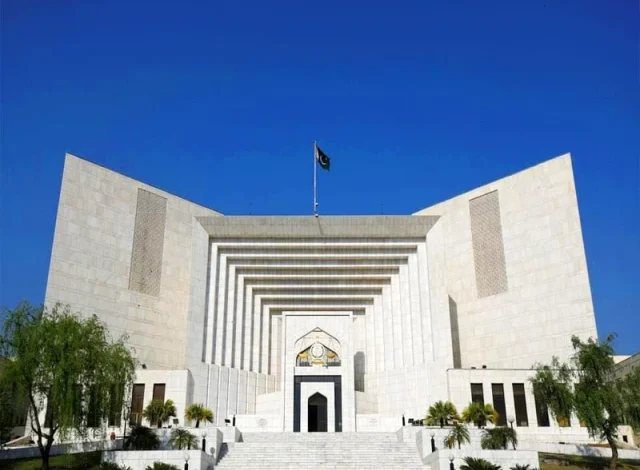Approval granted for livestreaming of case proceedings

The petitioners contesting the 26th Constitutional Amendment have successfully convinced a constitutional bench of the Supreme Court to permit live streaming of court hearings.
Experts assert that the primary hurdle for the petitioners will be persuading the Constitutional Bench to convene a full court to adjudicate the petitions contesting the change, which many contend has compromised judicial independence.
A unanimous eight-member bench, chaired by Justice Amin-ud-Din Khan, approved the live broadcasting of proceedings on petitions contesting the amendment hastily passed by parliament in October of the previous year.
Certain members of the CB voiced concerns that live-streamed hearings had been previously exploited. Notwithstanding these apprehensions, the bench granted the petitioners’ motion.
The legal community commended the ruling of the CB.
Advocate Abdul Moiz Jaferii stated that the Supreme Court has acknowledged the live broadcasting of cases pertaining to basic rights as a public duty.
It has evolved into an indispensable instrument for legal and non-expert analysis and criticism. It facilitates access to justice for all those with an internet connection and enables genuine participation in the judicial decision-making process.
“It ought to be standard practice in all superior courts nationwide. “It enables judges and lawyers to remain aware of their audience, and when public interest is involved, this represents a significant advancement,” stated Jaferii.
The true examination for the CB is whether the petitions for the formation of a full court will be permitted for consideration.
Former senator Mustafa Nawaz Khokhar has submitted a petition via Advocate Shahid Jamil Khan, requesting the enforcement of the majority ruling of the Supreme Court (Practice and Procedure) Act Committee (PAPA) to schedule hearings for the petitions challenging the 26th Constitutional Amendment before a full court.
On October 31, 2024, the PAPA committee instructed the SC Registrar, by a 2-1 majority, to schedule the petitions for November 4, 2024. Nevertheless, the cases were not arranged for a hearing. The CB decided on Tuesday that Khokhar’s plea be scheduled for hearing alongside the objections.
Khokhar remarked that the 26th Constitutional Amendment lawsuit will be one of the most significant cases in Pakistan’s legal history.
“The judiciary must either reassert its autonomy and liberate itself from the constraints imposed by the 26th Constitutional Amendment, or it will capitulate completely to the influence of those historically opposed to an independent judiciary,” he asserted.
Khokhar stated that during today’s session, they will vigorously advocate for a full court to adjudicate this case, referencing two principal grounds.
The majority decision of the PAPA committee should be sustained, making the chief justice’s dissenting opinion non-binding.
“Secondly, the CB, as a product of the 26th Constitutional Amendment, is unable to impartially assess its own legitimacy, resulting in a distinct conflict of interest.”
Given the CB’s prior denial to incorporate the original members of the bench in the reserved seats case, the likelihood of the issue being brought to Chief Justice of Pakistan Yahya Afridi for the establishment of a full court is minimal.
A top attorney indicated that there is a significant likelihood that all Constitutional Bench judges will participate in the proceedings on the 26th Constitutional Amendment case.
The current count of CB members is 15. The attorney observed that petitions challenging the 18th and 21st Constitutional Amendments were adjudicated by a full court of 17 members. “A minimum of 17 members must consider these petitions regarding the 26th Constitutional Amendment,” he stated.
Certain attorneys asserted that the government lacks the financial capacity to incorporate Justice Syed Mansoor Ali Shah, Justice Munib Akhtar, and Justice Athar Minallah into the bench adjudicating the case.
It will be evident today whether the CB judges are inclined to incorporate the two senior members into this bench, they stated.
Certain analysts think that the omission of Justice Syed Mansoor Ali Shah, Justice Munib Akhtar, Justice Athar Minallah, Justice Shahid Waheed, and Justice Malik Shahzad Ahmad Khan from this case may adversely impact the credibility of the bench.
They query how the CB, whose establishment under the 26th Amendment is being contested, could adjudicate this issue.
The majority of the Supreme Court judges were nominated by former Chief Justice Iftikhar Muhammad Chaudhry to various high courts following his reinstatement in 2009.
The former Chief Justice said that a judge must possess the fortitude to advocate for the independence of the judiciary, which currently faces jeopardy.
Nonetheless, it is a fact that the Independent Group, which possesses a majority in the Pakistan Bar Council and the Supreme Court Bar Association, endorses the 26th Constitutional Amendment. The same group has also gained advantages from the system operating under this change.
Conversely, Hamid Khan, leader of the Professional Group, has proclaimed that the forthcoming SCBA election will serve as a vote on the 26th Constitutional Amendment.